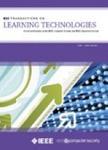版权所有:内蒙古大学图书馆 技术提供:维普资讯• 智图
内蒙古自治区呼和浩特市赛罕区大学西街235号 邮编: 010021

作者机构:Univ Belgrade Fac Org Sci Belgrade 11000 Serbia Monash Univ Fac Educ Clayton Vic 3800 Australia Monash Univ Fac Informat Technol Clayton Vic 3800 Australia
出 版 物:《IEEE TRANSACTIONS ON LEARNING TECHNOLOGIES》 (IEEE学习技术汇刊)
年 卷 期:2020年第13卷第1期
页 面:150-163页
核心收录:
学科分类:0401[教育学-教育学] 0808[工学-电气工程] 08[工学] 0812[工学-计算机科学与技术(可授工学、理学学位)]
主 题:Correlation and regression analysis education learning management systems learning technologies scaffolding mirroring scaffolds social technologies
摘 要:Learning design in a massive open online course (MOOC) intends to promote creativity, autonomy, and social networked learning, amongst other things. Students in a MOOC are required to self-regulate their learning to properly self-monitor their learning process and effectiveness of the adopted learning strategies. This paper presents the results of a study among 279 students enrolled in a MOOC that was enriched with a set of scaffolding interventions for social mirroring. The mirroring interventions supported social awareness and social embeddedness of learners. Associations between the use of the interventions and microlevel self-regulated learning processes were measured and analyzed. The extent to which those associations are affected by learner demographics and motivational characteristics was also investigated. Findings show that interventions that provide students, throughout the course, with learning updates and progress of peers are associated with the students engagement with learning tasks and applying changes in strategies for completing those tasks. Social awareness scaffold influenced more students low in need for cognition, with a higher education degree, high in performance-approach orientation and low in grit, to engage with their learning tasks, while its effect on the change in learning strategies was higher with those early and towards the end of their careers and high in performance-approach strategy. The social comparison scaffold affected more students low in mastery goal orientation and high in grit to work on their learning tasks.